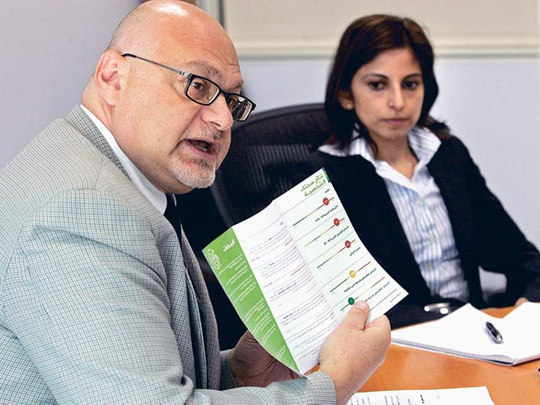
Abu Dhabi: Results of a screening programme designed for UAE nationals show that 70 per cent of Emiratis above the age of 18 are at risk of developing cardiovascular diseases.
The Health Authority Abu Dhabi (HAAD), the regulatory body of the health care sector in the emirate of Abu Dhabi, has released results of a screening programme known as Weqaya, which means "precaution" in Arabic.
The programme is designed to measure early indicators of a person's heart disease and stroke risk.
These include an individual's blood sugar levels, to indicate risk of developing diabetes; cholesterol, blood pressure, body mass index (BMI) and smoking habits.
So far a total of 185,000 Emiratis over the age of 18 years have been screened — which is 96 per cent of the state's nationals.
Results showed 30 per cent of those tested were overweight, another 30 per cent were obese, and more than 21 per cent either had diabetes, or were in danger of developing the condition.
HAAD Public Health and Research Manager Professor Salim Adib said a shocking 40 to 45 per cent of those tested under the Weqaya programme had been diagnosed with heart conditions, the leading cause of a death in the emirate.
Risk of death from heart disease was even higher than the risk of death in a road crash, which was 10 per cent, he said.
This month, individuals' Weqaya screening results would be delivered to families across the emirate, to offer them a "traffic light" indicator of their health.
Green indicated a person's health status was normal, amber was for moderate risk, and red for high risk.
The report cards would also contain advice on how people would improve their results next time with diet and exercise, and where to seek further medical assistance.
HAAD Public Health Programmes Section Head Dr Cother Hajat said: "When we first introduced the programme in April 2008, we immediately altered high risk patients of their condition, and made sure they received the right medical assistance".
Early detection
"In the meantime, we are following up on the four per cent of Emirati's who haven't been screened, and they are mostly between 20 to 28 years of age," Dr Hajat said.
"In order to encourage early detection, we have made Weqaya a three-year mandatory screening programme."
The health authority also planned to introduce extra neo-natal screening programmes in hospitals across the Emirate by September, to help reduce the incidence of inherited diseases.
The authority was hoping to make pre-marital screening for thalassemia compulsory.
Professor Adib said they were hoping to discount the expensive tests' costs, from more than Dh1,000 plus to Dh500." The dates for mandating the test was not yet known.
Plain truth: Picture of health
The following are statistics among Emiratis across the Emirates of Abu Dhabi
• 192,000 — Total number of Emiratis above 18 years in the Emirate of Abu Dhabi
• 185,000 (96% of total, four per cent remaining) is the total number of Emiratis above 18 years that have been screened through Weqaya
• 15 — 20 per cent are cancer patients
• 10 per cent — car accidents
• 70 per cent — risk of developing cardiovascular diseases (due to BMI, smoking, diabetes)
• 40 — 45 per cent- cardiovascular patients
• 21 per cent — diabetic patients.
• April 2008 — date when Weqaya was introduced
• Every Three years — mandatory Weqaya screening for Emiratis.
— Abu Dhabi Health Authority












